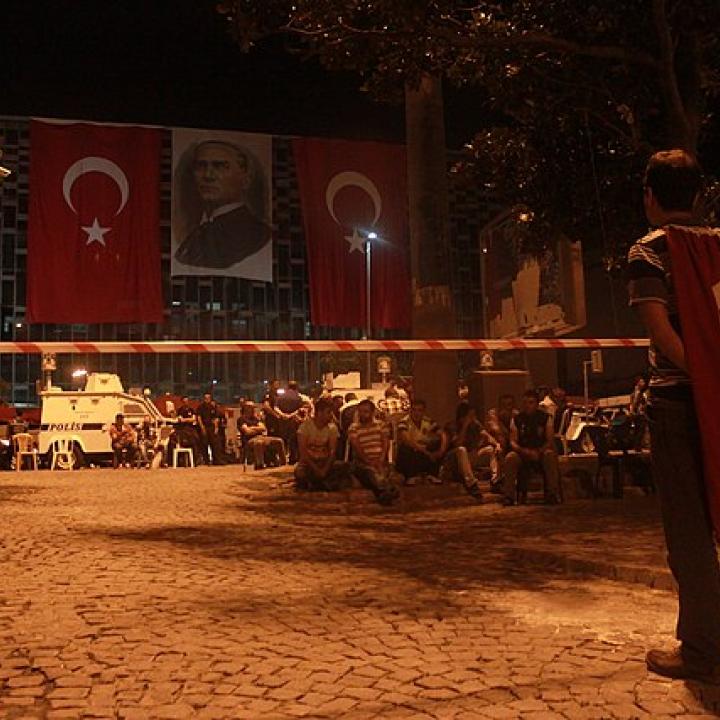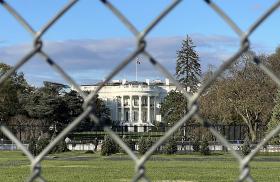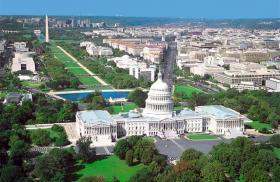
- Policy Analysis
- Fikra Forum
Re-evaluating Turkish Nationalism: A Bulwark Against the Religious Establishment

While the past few decades saw a dip in any political references to Turkey’s founder, opposition groups and the AKP alike have returned to Atatürk as a key political symbol of nationalism ahead of the elections.
In the western hemisphere, the word nationalism has a negative connotation, and often rightfully so. However, nationalism is not inherently evil. In fact, its ability to offset other societal forces has played beneficiary roles in a number of societies, especially in those places where a history of separation between religious and secular authority is lacking. When one compares the West and the East and evaluates the inevitable differences between the two cultural spheres, an argument can be made that one of the main reasons the East—especially the Near East—has lagged behind in some fields is the East’s lack of profanity in its original sense, that which is “outside the temple.” During the height of Rome and in post-Roman Europe to this day, the profane concept of life “outside the temple” thrived, ultimately resulting in the development of modern secularism and the rise of the public sphere.
Political development in the Islamic sphere has, however, taken a different path. The Quran and the Hadith both emphasize the role of Muhammad both as a prophet of a new religion and the first head of state of a newly-emerging Arabian empire. Since then, concepts of culture and state in the East largely maintained the Caliph as the ultimate authority, with no real profanity in matters of state.
Consequently, like many of its neighbors, Turkey’s path toward a secular political culture required the direct involvement of key political figures to separate the dominant religion from the concept of state. Especially during the collapse of the Ottoman Empire, the time was right for such a transition, as religion was largely being rejected by Turkish nationalists and Pan-Turkists in the 19th and 20th centuries.
The person at the helm of Turkey’s transformation was Atatürk, who worked to create a “new homeland, a new society, a new state” by filling the gap of religion with a newfound sense of nationalism. His revolution saw limited success—there was resistance to reforms and even his attempts at establishing a multi-party democracy resulted in “reactionary” elements quickly seeping into parties like the Free Republican Party—yet in the end he managed to lay a foundation of duality on which future secularism could prosper.
Atatürk, Rediscovered
Although Atatürk’s image was largely criticized and suppressed during the 1990s and early 2000s in Turkey, the concept of Atatürk as a political icon has had a resurgence in recent years, especially as Turkey experiences a full-scale counterrevolution. During the 1990s and early 2000s, most of the leftist-turned-liberal intellectuals saw Atatürk as a relic to be shelved, and AKP’s coming into power enhanced the ongoing renouncement of Atatürk. Many, myself included, saw this as a counter-revolution: The road to establishing theocracy. Yet, Atatürk as an icon is re-emerging, especially after the events of July 2016. Importantly, this new fixation with Atatürk is much different than old-school Kemalism: rather than attributing any specific political stance to Atatürk and his legacy, many Turks now view Atatürk more generally as a symbolic bulwark against religion and, more specifically, against a theocratic state and the prioritization of religious law.
The Gezi Park protests in 2013 were perhaps the first prominent sign of Atatürk’s re-emergence as a unifying icon. Though diverse in their demands as well as their ethnic, cultural, and political backgrounds, protesters loudly chanted together, “We are the soldiers of Mustafa Kemal.” This slogan transcended specific political boundaries. Moreover, it was likely the only way to prevent the protest from being ostracized by the public as linked to a specific political stream and the only alternative to an apolitical stance, either of which would have caused a loss of momentum. Through the symbol of Atatürk, protesters were directly challenging the increasingly-Islamist political environment in Turkey. Although the government infamously suppressed the protests by utilizing unlawful violence on many occasions, the “Atatürk-ist” appearance of the crowd shielded them from the worst.
Over time, Atatürk re-emerged as a symbol not just for the opposition. The Turkish government itself began referencing Atatürk more frequently in their discourse—though perhaps reluctantly—especially after the infamous coup attempt in July 2016. Even prominent Islamists like Mr. Bülent Arınç—a member of the AKP’s founding cadre and once almost as powerful as Erdoğan, though now at odds with him—paid tribute to Atatürk on several occasions after the coup attempt. Considering that the AKP and Islamist traditionalists in Turkey usually avoided even the mention of Atatürk’s name during their rise to power, the repeated use of Atatürk signaled a major shift indeed.
Slowly but surely, it seems that Erdoğan and the AKP have come to a realization: religion-based politics in Turkey that rely on alliances with religious sects and cults—i.e. the Gulenists, the Muslim Brotherhood, Nakshibandi order etc.—result in destabilization and dissatisfaction among the public, as July 2016 proved. In an attempt to accordingly replace its former alliance with the Islamist Gülenists, the AKP is now looking to conservative-nationalist parties like the Nationalist Movement Party (MHP) for support. In this context, the AKP government has adopted the symbol of Atatürk along with a new, conservative version of Kemalism to portray a more conservative nationalist image, which they hope will appease and appeal to the public.
However, the government’s embrace of Atatürk has only strengthened his image as a bulwark for the opposition in Turkey. In fact, the now frequent use of Atatürk as a rallying symbol by the government has made demonizing the opposition even harder for the AKP. Take a quick look at Turkish social media or speeches and commentaries by politicians, and it’s clear that no matter the political stance, almost every opposition demand is made in Atatürk’s name. The use of an Atatürk quote or a reference to Atatürk’s legacy allows the opposition to avoid the backlash that would arise had they expressed their views as ordinary people. It gives them a cover for their political opinions. Although it is sad, indeed, that citizens are forced to take refuge in icons to express their views in Turkey, this bleak reality is an important survival instinct for Turkey’s emerging secular-nationalist opposition.
Turkey’s Upcoming Elections
In a society where religion has long been used as a weapon of the governing elite, “nationalism” under the image of Atatürk has become a necessary buffer for Turkey’s opposition. While someone labeled as a “liberal” or a “leftist” can be ostracized and easily demonized by the dominant discourse, the nationalist Atatürk narrative now provides protection and symbolic meaning for Turks, allowing them to harken back to the secular-nationalist days of Turkey’s inception without directly challenging Erdoğan and the AKP, which are still conservative and religion-focused at their core. This is why Turkish youth are increasingly identifying as “nationalist” and “Atatürk-ist” in annual polls—it represents the rise of a secular nationalist identity in Turkey that is quietly challenging the status quo.
Ultimately, the current political overview of Turkey is curious indeed. Almost all of the major party leaders, including the Centre-Left Republican People’s Party (CHP) Chairman Mr. Kılıçdaroğlu, expressed themselves as nationalists, even making the Grey-Wolf hand sign—usually identified with MHP and its paramilitary organization the Grey Wolves. The AKP-led alliance is striving to utilize nationalism to extend their term and renew their exhausted discourse, while the opposition uses nationalism as a bulwark against the religious narrative as well as a means to sway the nationalist-leaning, center-right majority of Turkish voters. This makes two parties the key players in the forthcoming elections: the “Good Party” (IYI) as the only opposition party that has meaningful links with the nationalist voter base, and the Kurdish-oriented People’s Democratic party (HDP) as a decidedly non-nationalist party. Whichever alliance HDP falls in with will likely lose legitimacy behind any nationalist discourse they put forth.


